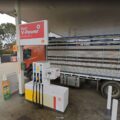Understanding Camping Generators
Camping generators are a great way to keep your gadgets charged and your campsite comfortable. You’ll find different types with various power outputs to suit your needs while camping. Here are some important points about camping generators.
Types of Camping Generators
Camping generators come in a few main types: solar, inverter, gas, and propane.
Solar generators are eco-friendly. They use the sun’s power and don’t make noise. However, they need sunlight to charge.
Inverter generators are quiet and efficient with a stable power output, making them perfect for electronics. Gas generators are common and reliable, but they can be noisy and need fuel. Propane generators are similar to gas ones, but they use propane, which can be a cleaner fuel option.
Comparing Power Output and Wattage
When choosing a camping generator, pay attention to power output and wattage. Smaller, portable generators may offer less than 500 watts, ideal for charging simple devices like phones or small lights.
For more demanding needs, such as an RV or multiple appliances, you’ll want something around 1,000 to 2,000 watts. It’s important to check the starting and running wattage of your devices to ensure your generator meets your needs. Keep in mind, a generator’s wattage determines not only what it can power but also how many devices it can handle at once.
Selecting Your Camping Generator
When choosing a camping generator, you need to focus on the power you require and how efficiently it consumes fuel. By assessing your needs carefully, you can select a reliable power source that enhances your camping experience.
Assessing Power Needs
Before buying a portable camping generator, list all the devices and appliances you plan to use. Consider items like lights, a small refrigerator, or a phone charger. Each of these has a specific wattage requirement.
Create a table to sum up these wattages. Ensure your generator’s output meets or exceeds this total. For example, a generator with a 3000-watt output can handle most camping needs comfortably. Be mindful of starting watts, which are typically higher than running watts.
Choosing the right power capability helps avoid overloading the generator, which can lead to equipment failures.
Fuel Efficiency and Consumption
It’s important to note how much fuel your camping generator uses. The goal is to use your generator without constantly running out of fuel, which can be a hassle during your trip. Inverter generators are often more fuel-efficient compared to conventional models. They adjust engine speed based on power demand, saving fuel.
Look for models that offer longer run times on a single tank. This reduces refueling frequency and helps with convenience. Some generators may also have eco-modes, which further enhance fuel efficiency by lowering consumption during lighter loads.
By prioritizing fuel efficiency, you can enjoy power without frequent interruptions, making your camping life easier and more enjoyable.
Camping Generator Features for Comfort
When camping, having the right generator can transform your outdoor experience into a more comfortable one. It’s important to consider both the noise emissions and user-friendly features, ensuring a smooth blend of convenience and low disturbance.
Emission and Noise Control
Finding a camping generator that is quiet and eco-friendly is key. The decibel rating indicates how much noise the generator makes. Generally, anything under 60 dBA is considered whisper quiet, which is ideal for maintaining the peace of the great outdoors.
Emission regulations are important too. Many generators meet strict standards, reducing air pollutants. This means you can enjoy your camp without worrying about harming nature. Look for labels like EPA-certified to ensure you’re getting a cleaner option.
Safety features like low oil shutdown provide additional assurance, preventing damage to the generator by automatically turning it off when oil levels are low. This helps keep your camping area safe and your generator in good condition.
Convenience and Ease of Use
Portability makes a huge difference. Modern generators are often lightweight and come with handles for easy transport. Checking the weight beforehand ensures you won’t have trouble moving it from the car to the campsite.
User-friendly controls are essential. Generators with simple startup options, like push-button starts or clearly labeled interfaces, mean you can get power when you need it, without hassle.
Plug options are another consideration. Many models offer multiple outlets, such as USB ports, that allow you to easily charge different devices simultaneously. Choosing a generator that supports your needs makes your camping trip more enjoyable. These convenient features allow you to focus more on your downtime and less on equipment fuss.
Popular Camping Generator Models
When camping, having the right generator can make a big difference in comfort and convenience. This section covers popular models known for their performance and dependability, including Honda’s long-standing reputation, Yamaha’s versatility, and the growing interest in solar-powered generators.
Honda’s Reliability
Honda generators are well-known for their reliability and efficiency. The Honda EU2200i is a favorite among campers because it is compact and surprisingly quiet at 48 to 57 dBA. This model provides 2,200 watts of power, which is plenty to run small appliances such as mini-fridges and laptops.
The Honda EU3000i is another great choice, known for being quiet and powerful with 3,000 watts of output. It weighs more than the EU2200i, but offers enough power to support larger setups, making it ideal for those who need more energy. Honda’s focus on quality and durability ensures these generators are a solid investment.
The Versatility of Yamaha Generators
Yamaha generators are praised for their versatility and quality performance in different settings. The Yamaha EF2000iSv2 stands out with a 2,000-watt capacity that is perfect for a variety of camping needs. It is lightweight and features smart throttle technology, which helps improve fuel efficiency and reduce noise levels.
This model maintains a low noise level, making it an excellent choice for campers who value peace and quiet. Yamaha generators are known for their long-lasting engines and the ability to handle different equipment types. You can expect a reliable and easy-to-use experience that fits various needs.
Exploring Solar-Powered Options
Solar-powered generators are becoming more popular for their eco-friendliness and quiet operation. The Jackery Explorer 500 is a leading option in this category, offering 500 watts of power without the need for gas or emissions.
This generator is portable and easy to use, with multiple output ports for charging devices like phones and laptops. Solar generators like the Jackery are an ideal option for those looking to minimize their carbon footprint while camping. They are best suited for sunny environments to charge efficiently, providing a sustainable power source for camping adventures.
Maximizing Your Generator’s Runtime
When camping, a reliable portable generator can make life easier by powering your devices and appliances. To get the most out of your generator, focus on effective fuel management and regular maintenance.
Fuel Management
Managing your generator’s fuel is crucial for maximizing runtime. Start by checking your generator’s tank capacity. A larger tank allows for longer operation without refueling. Always ensure your tank is full before starting your generator.
Fuel type matters. Using high-quality fuel can improve efficiency and reduce wear. If you use an inverter generator, it’s particularly fuel-efficient, giving you quiet and clean energy for your trip.
Consider creating a fuel schedule to keep track of when to refuel. This helps prevent running out of fuel unexpectedly. If possible, lower the load on your generator by using energy-efficient appliances. This conservative approach stretches your fuel further, making the generator last longer on a single tank.
Maintenance Tips
Regular maintenance keeps your generator running smoothly and extends its lifespan. Check oil levels frequently and top them up as needed. Oil is the lifeblood that keeps your machine functioning effectively.
Pay attention to the air filter. A clean air filter allows better airflow, improving efficiency and engine life. Clean it regularly, and replace it if worn out.
Remove debris around your generator to prevent obstruction. This ensures proper intake and exhaust, keeping it from overheating.
Plan routine inspections for your generator, especially before heading out on camping trips. Regular checks help catch small issues before they become big problems, ensuring you have a reliable power source whenever you need it.
Generators for Different Camping Styles
When camping, the right generator can vary based on how you camp. RV camping often needs more power, while backcountry camping benefits from lightweight, portable options.
Tailoring to RV Camping Needs
For RV camping, a reliable power source is important. RVs generally require more wattage to run appliances like air conditioners, microwaves, and fridges. Quiet camping generators are a great choice because they provide the necessary power without disturbing the peaceful environment with noise.
Many campers choose inverter generators because they offer a good mix of power and quiet operation. For example, models like the Honda EU 2200i are popular. They are powerful enough for large appliances and maintain a low noise level.
Consider the generator’s fuel type. Gas-powered options are common, but portable solar generators are eco-friendly and often quieter. Solar generators can also be paired with RV solar panels to extend battery life and reduce fuel use.
Backcountry Camping Solutions
In the backcountry, every ounce matters. Campers often look for portable and lightweight solutions. Power banks are handy for charging small devices like phones and cameras. They’re convenient and simple to carry.
For more significant power needs, compact generators fitting the “quiet camping generator” category are ideal. Choose those that are light yet robust, with around 500 watts, which can handle lights and tiny devices. Inverter generators are again a popular choice here, offering low-weight and low-noise options.Some campers prefer portable solar generators. They are great because they don’t need fuel, are quiet, and can often be supplemented with a foldable solar panel for recharging.








